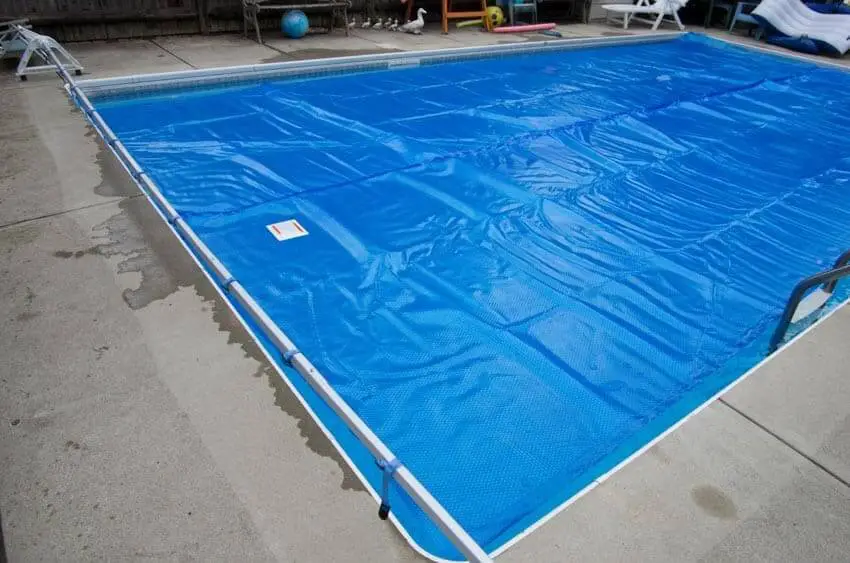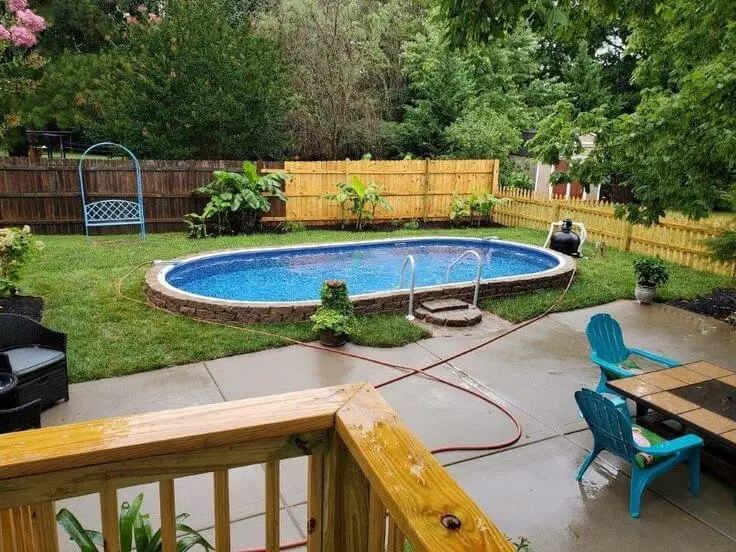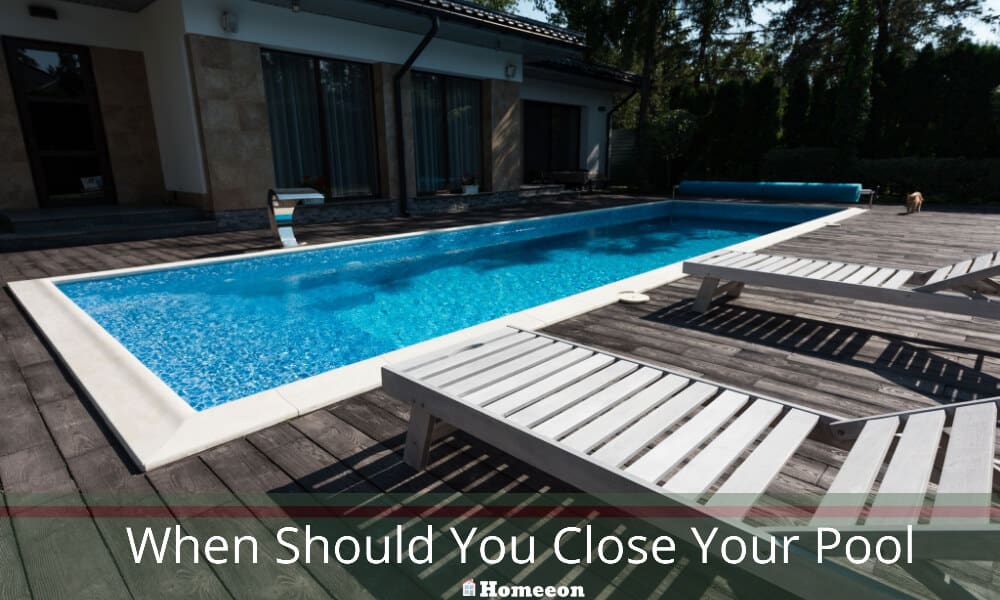Last Updated on August 14, 2023 By Emma W. Thomas
Closing your pool should be done before the water temperature drops below 65°F (18°C), usually in late fall. This prevents algae growth and freezing-related damage. Maintain proper water balance, clean the pool thoroughly, and use a winter cover to preserve water quality for the next season.
When Should You Close Your Pool?
Closing your pool at the right time is crucial to maintain its health and ensure an easy reopening in the next season. Here’s a detailed guide on when and how to close your pool:
When to Close Your Pool:
- Temperature Consideration: The ideal time to close your pool is when the water temperature consistently drops below 65°F (18°C). This temperature range is generally not conducive to algae growth and bacterial activity.
- Seasonal Timing: In most regions, this typically occurs in late fall, before the onset of colder weather. However, the exact timing might vary based on your climate and geographical location.
How to Keep Pool Water Healthy For The Next Season
Maintaining your pool water’s health during the off-season ensures a smooth reopening in the next season. Follow these steps to keep your pool water healthy:
1. Continuous Monitoring: Regularly check the pool’s water level and cover condition. Address any issues promptly to prevent debris buildup and maintain cover integrity.
2. Proper Cover Installation: Ensure your pool cover is properly secured to prevent leaves, debris, and animals from entering the pool. A well-fitted cover also helps reduce sunlight exposure, inhibiting algae growth.
3. Winter Chemicals: Add winterizing chemicals like algaecide and a winter floater. Algaecide prevents algae growth, while the floater gradually releases sanitizer, helping to maintain water quality.
4. Periodic Maintenance: Even during the off-season, perform occasional maintenance:
- Skim: Use a pool skimmer to remove debris that accumulates on the cover.
- Brush: Brush the pool walls and floor to prevent algae and stain buildup.
- Inspect: Inspect equipment, cover, and pool area for any issues.
5. Winterize Equipment: Properly winterize and store pool equipment, including pumps, filters, and heaters, according to manufacturer instructions. This prevents freezing-related damage.
6. Air Pillow (Optional): If you live in a colder climate, placing an air pillow in the center of the pool before covering helps prevent ice expansion from damaging the pool walls.
7. Regular Cover Checks: Periodically check the cover’s tightness and integrity. A loose cover can let in debris, and a damaged cover might need repair or replacement.
8. Water Chemistry Testing: Test the water chemistry occasionally to ensure it remains within acceptable ranges:
- pH: Aim for a pH level of 7.2 to 7.6.
- Alkalinity: Maintain alkalinity between 80 and 120 ppm.
- Sanitizer: Check chlorine or other sanitizer levels to ensure they’re within recommended levels.
9. Address Water Issues: If you notice any water issues during the off-season, address them promptly to prevent them from worsening.
10. Proper Opening: When the next pool season approaches, follow a thorough pool opening process:
- Remove the cover and clean it.
- Vacuum and skim the pool to remove debris.
- Balance water chemistry before adding swimmers.
What You Need To Know Before Closing Your Pool

Closing your pool needs proper preparation and a good knowledge of how to balance the chemicals. You will also need to dedicate a full day to this process as improper closing will cause issues when opening it. Here’s what you need to know;
- Ensure that the mechanical systems are prepared properly for freezing temperatures. Remove any standing water from heaters, pumps, and plumbing lines, and secure a good pool cover.
- Do not empty your pool for the winter. Doing this may cause the soil around and under the pool to freeze, expand, and eventually move your pool out of place. You can drain your pool 4 inches to 6 inches below the skimmer.
- Winterize your pool properly to minimize the chances of piping and equipment freezing. Doing this will minimize repairs and extended delays when clearing your water for reopening your pool.
- Add shock to your pool two times during the offseason to keep the water clear until you reopen in the spring. You can do this around Easter and Thanksgiving since the water will still be thawed, and the chemicals will get in without resting on top of the ice.
- Have a professional test your water so you can put the right chemicals in the correct amount.
You can close your pool by yourself if you have proper instructions but make sure to follow them correctly. Following the right procedures makes it easy for closing and opening your pool at the right time.
What Happens To Your Pool If You Don’t Winterize It?
Although it may be tempting not to close your pool as summer comes to an end and winter sets in, it is important to note that closing your pool will save you money and also keep the structure intact.
Here’s what to expect if you are skeptical about closing your pool;
1. Algae Infestation
Failing to close your pool during winter may cause algae infestation if your chlorine system fails. The growth of algae in your pool can destroy your pretty blue water leading to an expensive and unsightly cleanup.
Algae can be an eyesore, and getting rid of it may be quite draining to your wallet. When you want to use your pool again, you may have to drain the water fully and replace it, which could be expensive.
Algae may not be a health hazard, but the bacteria that feed on it could cause rashes, gastrointestinal illnesses, ear, and respiratory infections to the swimmer. You will, therefore, have to clean your pool regularly.
2. Pool Falling Apart
Your in-ground pool is covered by a liner that prevents the water from damaging its foundation. If the liner’s surface gets cracks, it can be detrimental. When you close your pool and inspect it regularly, you will assess any damages during summer and solve the issues on time. You will also reduce the risks brought about by extreme winter conditions that may lead to cracking.
If, on the other hand, you don’t close your pool, the water will freeze when the temperature drops. The freezing temperatures and ice can rip open the cracks or expand the existing ones.
3. Additional Cost
If you leave your pool open during winter, you will have to run your pumps to prevent freezing which may cause structural damage. You will use a lot of electric energy to keep your pumps running hence the additional cost.
Your filter and plumbing system could also freeze and cause the water temperature to drop significantly and shut off your chlorine systems. All these factors will lead to extra costs for repairing your pool when spring finally comes.
Is It Okay To Shock Your Pool Before Closing?
Shocking your pool kills bacteria that might thrive during winter. You can carry out the procedure a few days before shutting the pool or on the night before you close it for winter.
Essential Tips To Close A Pool In Winter.
Although winterizing your pool may seem complicated, you can make it a pain-free and simple process with a little preparation.
1. Winterize One Week Before Closing
Add a phosphate remover to your pool one week before closing to prevent any potential algae infestation. Ensure that you don’t shut down before the temperatures drop below 60 degrees.
2. Vacuum And Brush
Ensure that you clean your pool thoroughly before closing for an easier opening during spring. Ensure also that you brush the floor and sides, skim the surface and clean out your pump baskets and skimmer after vacuuming.
3. Control The Water Level
Your water level should range from 4-6 inches below for the freezing area, the skimmer should be vinyl-lined and the tile line should be plaster.
4. Shocking Your Pool
You should add chlorine or non-chlorine chemicals to destroy algae, bacteria, and chloramines that may thrive during winter. You can either shock a few days or the night before closing your pool.
5. Balance The Pool’s pH
Use a test kit to measure your pool’s chemistry. Ensure that the total alkalinity lies between 80 and 120 ppm, and its pH level is 7.4-7.6.
6. Drain Pool Lines
Ensure that the pool filter, heater, pump, and other equipment are drained before closing. You should also add antifreeze for freezing temperatures to prevent repairs that result from damaged pipes.
Remove filter cartridges and DE grids from the pool and clean them fully. You can use a vac-liner to blow any remaining air out of the filter and pump. Store the drain plugs in a pump basket during winter to prevent any potential damage.
7. Use Air Pillow
Use an air pump to inflate an air pillow in the middle of the pool and tether it to an anchor to keep it in place. You can also use a pillow pal to create a lock between the bottom of your winter cover and the air pillow.
8. Secure Your Pool
Protect your pool with a secure cover that is tightly sealed. There are various covers that you can use for this purpose, namely;
9. Winter Covers
These covers do not protect pets or people from falling into the water as they are not sealed across the pool. You can use a mesh winter cover to protect your pool from debris while at the same time letting water filter through the material. This process helps to alleviate any heavy weight caused by freezing or standing water.
You can also use solid winter covers to give a more sturdy seal and prevent debris from entering your pool. You may, however, need a cover pump to drain water throughout the winter.
a) Safety Covers
Safety covers offer the greatest level of protection against any unwanted substances such as winter storm debris. The covers are usually anchored onto the surrounding deck
B) Pool Leaf Nets
These covers are typically used in areas that have a mild climate. They are mesh pool covers that let water pass through while at the same time blocking huge debris. The covers prevent acorns and leaves from getting into the pool.
9. Monitor Chemical Balance
Use a test kit to regularly check the water chemistry or consult a service technician if the chemicals are unbalanced. Ensure that the water has the correct pH at all times.
Is It Okay To Close A Green Pool?

Closing a green pool or one filled with debris could permanently damage or stain the surfaces. Protect your pool with balanced and clean pool water, a strong cover, and a winter kit. If you close your pool green with algae, unbalanced water, or dirty with debris, it will cause staining and saturation of water with dead algae cells, which may lead to more algae growth.
Final Word
If you close your pool during winter, it will save you a lot your time, money, and labor when the spring comes. It will prevent damage such as cracks or staining of the walls and surfaces, which may require a lot of repair work before opening.
Ensure that you shock and monitor the water chemistry to keep algae growth under control.
References:
https://poolscouts.com/the-best-time-to-close-your-pool/
https://www.poolcalculator.com/pool-maintenance/when-to-close-your-swimming-pool/
Emma is a graduate of Domestic Science or Family and Consumer Sciences (Home Economics) from the University of Wisconsin. She has 7 years of experience Working with the strategic section of BestBuy and now writing full-time for Homeeon.
From Managing the Home, Interiors, Cleaning, and Exteriors to Gardening and everything about Making A Home Liveable – is her passion and this Homeeon is the result of this.
Emma loves decorating her home with the best stuff found online. She cares about quality over anything and writes reviews about them here in Homeeon. Get in touch with her over Pinterest.
Keep reading her blogs.
